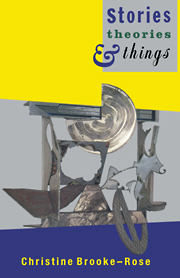1 - Stories, theories and things
Published online by Cambridge University Press: 20 August 2009
Summary
The topic of an essay or novel, while I work on it, becomes the most important topic in the world for me, otherwise I couldn't work on it. To write, therefore, about myself as writer, as I have increasingly been asked to do, is very difficult without sounding self-important. Any famous name I may mention by way of illustration will make me seem to be putting myself on the same level, and any statement I may make about anything being unnoticed, on which I spent much thought and time, will sound like petulant complaint, instead of a point about the greatest gap of all, that between intention and effect. Moreover, I have also at times been asked to write about my relationship, as author, to literary theory, which act threatens to quarter or sexter me among all the frailties and fallacies variously attributed to the different functions of Jakobson's diagram.
Nevertheless those two things (myself as novelist and my relation to theory) are what I am going to write about in this opening chapter, not just to get rid of it, but to give a certain personal, author's perspective on the critical, that is, supposedly more ‘objective’ (but see Ch. 2) chapters that mostly make up this book.
This preamble is an attempt at a distancing disclaimer. I think I can honestly say that my attitude to my own creative work has become (or has been made to become) quite wise.
- Type
- Chapter
- Information
- Stories, Theories and Things , pp. 3 - 15Publisher: Cambridge University PressPrint publication year: 1991



